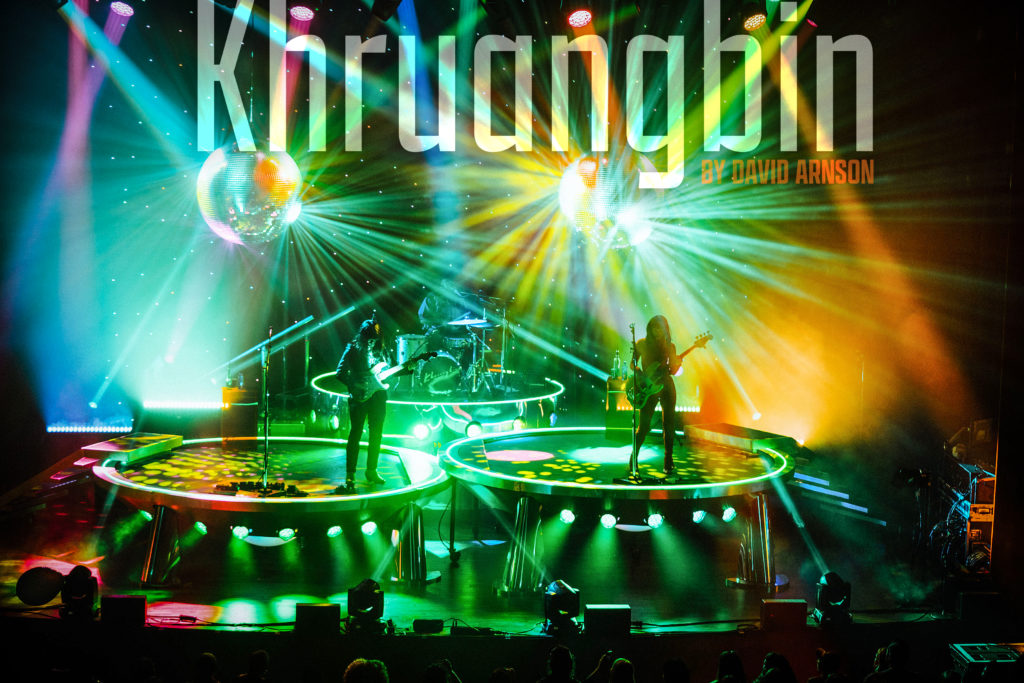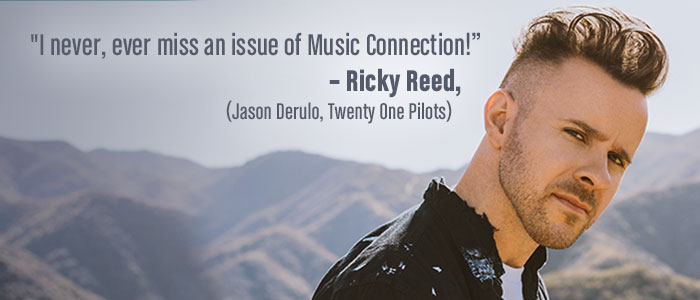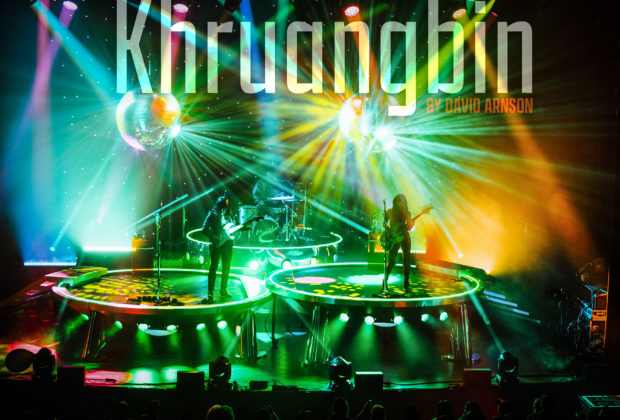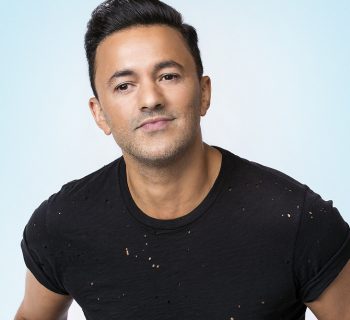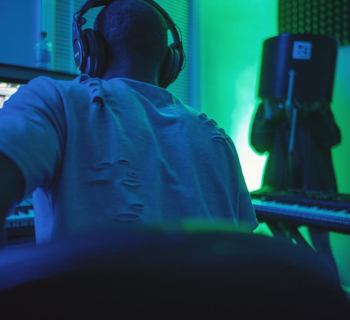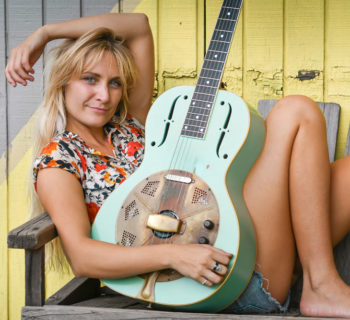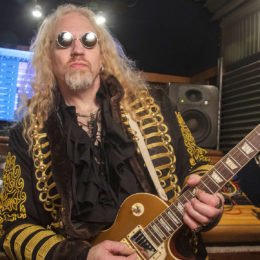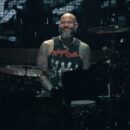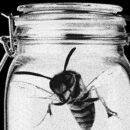Equal parts dance and chillout, Khruangbin weave funk, surf instrumentals, dub reggae, and especially Thai, to make some truly fascinating music. It’s an intriguing combination that has resulted in a stunning, unexpected success story.
From Houston, TX, the band (bassist Laura Lee Ochoa; guitarist Mark Speer, drummer Donald “DJ” Johnson) has captivated an ever-widening audience with a prolific number of releases over the past few years, including their first three albums The Universe Smiles Upon You (2015) and Con Todo El Mundo (2018) and Mordechai (2020). Mostly instrumental, Khruangbin’s music is alternately groovy, vibey, atmospheric, hypnotic, calming, euphoric and even intoxicating. And the band is continually expanding not only its sound but its sales figures, increasing its profile with standout appearances on compilations, remix albums and with a successful pair of EPs (Texas Sun and Texas Moon) made in collaboration with soul singer Leon Bridges.
Now, Khruangbin’s fourth album, Ali—releasing September 23 on the Dead Oceans label—is a collaboration with African guitarist Vieux Farka Touré, known as “the Hendrix of the Sahara.” An inspired tribute to Vieux’s legendary father, the “desert blues” master Ali Farka Touré, the album recreates some of the man’s most resonant work while remaining faithful to the originals’ integrity. And, as evidenced by Khruangbin’s growing concert draw, a new generation of fans is responding in a big way.
The trio’s recent Space Walk Tour, for example, has featured two sold-out nights at Red Rocks, two sold-out debut performances at N.Y.C.’s Radio City Music Hall, a Glastonbury Festival performance, a sold-out show at London’s Alexandra Palace, and more. This month, Khruangbin will join The Roots, Haim, The Flaming Lips and more for “The Big Climate Thing” festival at New York’s historic Forest Hills Stadium. Yes, it’s clear the music of Khruangbin (a Thai word meaning “airplane”) is lifting and transporting the musical sensibilities of an ever-growing audience.
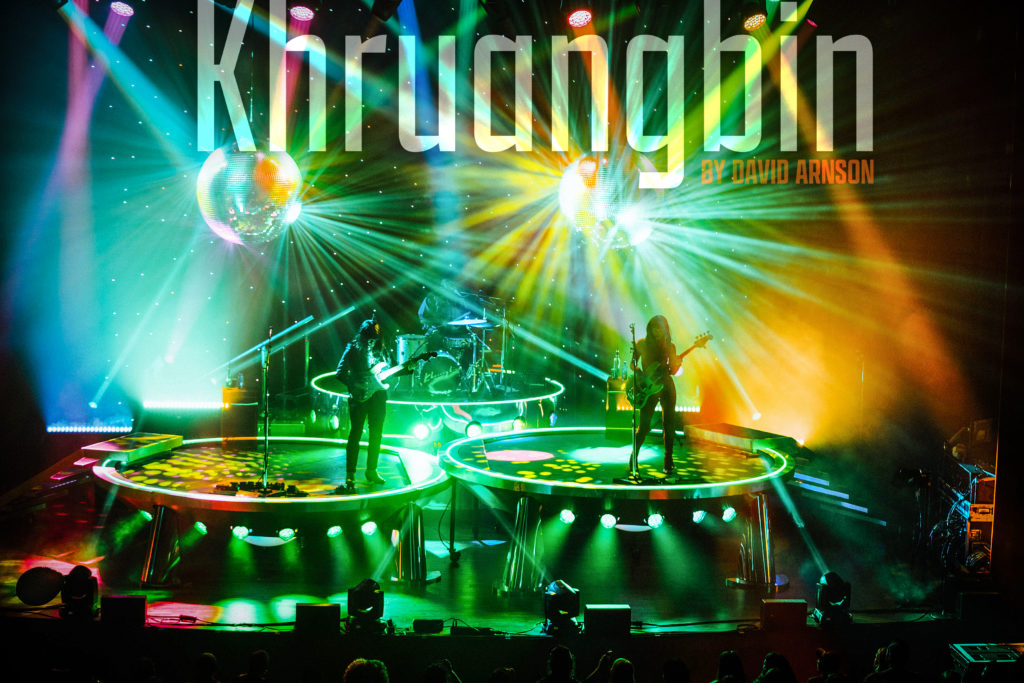
Music Connection: Today we’ve got drummer Donald “DJ” Johnson and bassist Laura Lee Ochoa on Zoom. You know, I’d heard your music for a couple years and, when I saw you a few years ago at the Desert Daze Festival near Joshua Tree, what was unexpected was your visual presentation, the wardrobe, wigs, etcetera.
Laura Lee Ochoa: I was active as a visual artist before I was a musician. So, I think a visual presentation of things has always been really important to me and I always admired the alter ego musicians and what that presence brings to a live show. In our beginning, we had more downtempo songs, if not ALL down-tempo songs, and they were all instrumental. So, in terms of performing live and being able to grab the attention of a new audience, I thought it was important to have a certain visual presence to kind of lure people into our universe, right? We’ve had our look from show one.
MC: Meanwhile, DJ, you’re holding it down “au natural,” like in ZZ Top, the drummer’s the guy WITHOUT the beard, right?
Donald “DJ” Johnson: In the past year, I’ve been more focused on curating an image for myself and a basic persona that’s unlike my outward basic persona in the real world—it helps me disappear when I’m not on stage!
MC:You guys started in Houston. Is there a specific Houston scene that you plugged into? What’s it like to work the city’s club scene?
Johnson: Yeah, Mark and I actually met on just the local music scene. In Houston, you know, most people play in churches, mostly the good musicians in church gigs. You’re able to support, you know, sustain your life playing at a church because they pay well, most of them.
And most of those guys also play in the R&B circuit around town, which is where Mark and I met. We met at a jazz club called Red Cat Jazz Cafe, back in 2004—it’s no longer there. It was a really prominent spot. The musicians would kind of hang out, go check out acts and things like that in those days. I could remember going watching Robert Glasper (Grammy-winning jazz pianist) and Chris Day. They would bring in special guests and host nights there. But yeah, it was just a place where the music community would all gather and hang out.
MC: When you say “church gigs” does that mean playing gospel or doing church dances?
Johnson: Yeah, playing gospel music at church, in this instance part of the house band at church.
MC: How about you, Laura, how did Khruangbin come together for you?
Ochoa: I met Mark through mutual friends. I wasn’t playing music at all when I met Mark. And Mark and DJ used to have dinner after their church rehearsals and I crashed their dinner. I had dinner with them once a week for three years before I ever started playing bass and started Khruangbin.
MC: So, did Mark give you lessons? Or was it like The Clash, where they put pieces of tape on your bass at the beginning?
Ochoa: No, no tape! I would play bass with Mark present. I would play along to records and he would kind of critique my playing or ask me questions about how I was playing things, to encourage further development.
Johnson: I wouldn’t want to get this misconstrued in any way, but Laura Lee started the band. If it wasn’t for what she was doing, Khruangbin wouldn’t exist!
Ochoa: I had started to play bass and I really liked it and I was just like in a naive place where, you know, like, “Hey I want to start a band! Will you guys be in my band?” And it worked!
MC: As far as the Houston scene goes, how did you fit in or not fit in? And how did you get people to come to your gigs?
Ochoa: I think musicians are generally outcasts, but even within the music world, Khruangbin are “outliers,” so to speak. People either really love us or don’t understand us, I think. I mean, our very first show was opening up for a good friend of ours, Robert Ellis, at his record release. And then we got small gigs around town and I was kind of not interested in playing to the same people every show, because that’s not how you build. So, we waited and we recorded and I moved to London and farmed out the music to as many DJs and people in the industry as I could, and slowly but surely started to gain a community following to where we got our first tour. We’d probably played no more than 10 gigs.
MC: So, would you say you started by promoting your stuff to English DJs?
Ochoa:Yeah, anything first happening was with Bonobo, an English DJ, putting us on his Late Night Tales compilation.
MC: How long did you move to London for?
Ochoa: I was there for, like, three and a half years. Yeah, I met our publisher—all these things have changed since—but publisher, agent, management, label. And then once you find your way in, then it’s actually kind of a small world. But it “takes a minute” to get there!
MC: So, you were in London for three years, roughly, but the band was still existing in Houston? Did you fly back and forth a lot?
Ochoa: No. Before I moved, we recorded everything that we had, which was about 10, 12 songs. And then those were released over the course of three years. So, our first seven-inch and two EPs were all released out of that collection of songs. To the greater world, it appeared as if we had been going back and forth in the studio, but actually we just recorded all those songs at one time! I lived in London, they lived in Houston, and we put those things out slowly but surely. And so, we got our record deal, and then I flew back to Houston where we recorded the first full-length album. Once the record landed, we started touring.
MC: Oh, thank God! One thing that you guys have a good feel for is a funky beat. DJ, had you and Mark been playing in funk ensembles?
Johnson: No. Mark and I met around 2004 and most of the playing we were doing was at church, playing at St. John’s downtown. And real gospel music IS funky! Funk can encompass all genres.
Ochoa: I think funk is just a state of mind. I think funk music as a genre is interesting because I think that… I’m not sure if I find modern funk bands actually feel funky! I don’t know…It’s just a groove thing.
MC: It’s also really fascinating how you guys have incorporated a lot of instrumental rock, not so much the world beat stuff but surf instrumental rock. When I saw you perform, you guys pulled out “Pipeline” or “Telstar,” or some definite classics.
Ochoa: We did some Dick Dale stuff…
MC: Was that something you were interested in when you were first starting Khruangbin?
Ochoa: When we first started, the band was listening to a lot of Thai funk, Thai rock, Thai folk music.
MC: I know that there’s the ‘phin’ (Thai lute) music. And there are a lot of Thai garage-rock compilations out there…
Ochoa: Those Thai garage compilations coming out, there are a plethora of them and it’s gorgeous because a lot of people have shone some light on this music. There’s a blog spot we used to follow called Monrakplengthai, which means “I love Thai music.” And this guy was living in Thailand and collected Thai cassette tapes, and every day would upload a new cassette tape to his blog with some information on it. And Mark was mining that blog for a while and making mixtapes-to-CDs out of the music that he found off of that site.
And the thing is, music from the ‘60s and ‘70s in Thailand was inspired by some of the only touring artists that were going over there. And the Shadows (‘60s English instrumental combo) was one of the first bands to ever tour the world. So, surf rock ended up influencing musicians in Southeast Asia. And they were already listening to James Brown. So, there was this natural funk and surf influence in their music and we were then listening to their music for inspiration. So, there’s like an undercurrent that comes from that tradition.
MC: I really like that Khruangbin are being good ambassadors of instrumentals!
Ochoa: Yeah, most of the time I like listening to music without words or in another language, because I like to daydream and if I can understand what people are saying, it sometimes takes me out of myself, wherever I am.
MC: You also seem to be good ambassadors of world music. You’ve started with some Thai, and you’ve done a dub album, and your next album is with Vieux Farka Touré soon. I’ve seen Vieux Farka Toure’ and it was really enjoyable. It was funny, he was joking about how a guy in his band kept pressuring him to do stuff by his father. And so he said, “All right, all right. I’ll do ONE song by Ali Farka Toure’!”
Ochoa: Our whole album with him is all songs by his father!
Johnson:Yeah, the album’s called Ali!
MC: So, DJ, how’s your rhythm vocabulary? Have you been able to assimilate a lot of world rhythms?
Johnson: I listen to a lot of it, and a lot of it gets ingested into my subconsciousness, but I think, as far as program, we’re all about blending those styles and, you know, seeing how they mesh all together. Particularly when I get on stage and I’m playing live, I’m just trying to see, you know, booties moving and people dancing. So, for me, that’s “four-on-the-floor.” Yeah. I’ll take bits and pieces of everything I hear, and some of it comes out of you.
MC: As long as you’re using your powers for good and not evil, right? (laughs)
Johnson: Right!
MC: Khruangbin’s success has been stunning to watch and to listen to. Things like selling out large legendary venues like Radio City in New York and Red Rocks near Denver is something special. What would you say has been the big breakout moment for Khruangbin? The point when you said, “Okay, we’ve really broken through.” Was it at a particular release of yours? Maybe playing a certain festival?
Ochoa: I think our second album was when things started to feel bigger and there was more momentum. There’s a lot of moments, you know, over the course of time, like Calf Born In Winter was our first thing, getting on that compilation Late Night Tales.
MC: Was that the Bonobo record?
Ochoa: Yeah, that was our first thing and then we opened up for Father John Misty in Europe on our first major tour, which was a moment. And then the release of our second album, we saw support from all the major independent radio stations. We were on all the big festivals and things started to feel like it was moving. And then with the release of Mordechai and Texas Sun over COVID, coming back to the music world post-pandemic, we’ve experienced a really big increase in how many people are out there.
MC: And what’s the story with Texas Sun? Can you tell us a little about how you hooked up with singer Leon Bridges?
Johnson: Leon Bridges is an R&B soul artist from Fort Worth, Texas. He released his first album Coming Home in 2015. When he released a second album, we were fortunate enough to get to support him on tour as well as supporting our record. So, by us being on his “Good Thing” tour it gave us this chance to hang out and get to know each other. And, of course, being Texans we have the common ground of sharing the home state and that’s how that project came to be.
Ochoa: Leon was huge. Yeah, “River,” off of his first record, was a huge success. He went from zero to 60 in his trajectory. He’s had a hit, I think, off of every record, he’s won multiple Grammys, like best R&B album, I think twice. He’s got an incredible voice. He’s been in the major-label machine. So, I think our project with him brought him to a more indie place and allowed a lot of different sides of him to shine and a lot of different sides for us to shine. We opened up for him in 2018 on a U.S. tour and became really close. And we like just making music and NOT singing, and he obviously loves singing. So, it was a win-win.
MC: How did you guys hook up with Vieux Farka Touré for your new album Ali?
Johnson: His camp reached out and wanted to see if a collaboration was a possibility and were we open to the idea, so we sat down and had lunch and discussed it. And yeah, we put it all together and made it happen. He came out to Houston and we spent about a week in the studio recording.
MC: Where does one have lunch with Vieux Farka Toure’?
Ochoa: He brought it! He or someone in his family made us food every day, he came to the studio with a giant fish and rice and vegetables!
MC: That’s awesome. And let me ask you a couple questions about some of your songs that I was wondering about? I was wondering what the story was behind the song “Evan Finds the Third Room,” it’s got that “YES” refrain in it.
Ochoa: It’s a collage of four inside jokes, it’s nonsensical, it’s just supposed to be fun.
MC: The song in Spanish, “Pelota”?
Ochoa: It’s about a ball of soot, the second line translates to “I want to be a ball of soot” and it’s a reference to those little characters in the movie Spirited Away. Yeah, I just like those little (animated) soot balls!
Contact Grace Fleischer, gfleisher@shorefire.com
